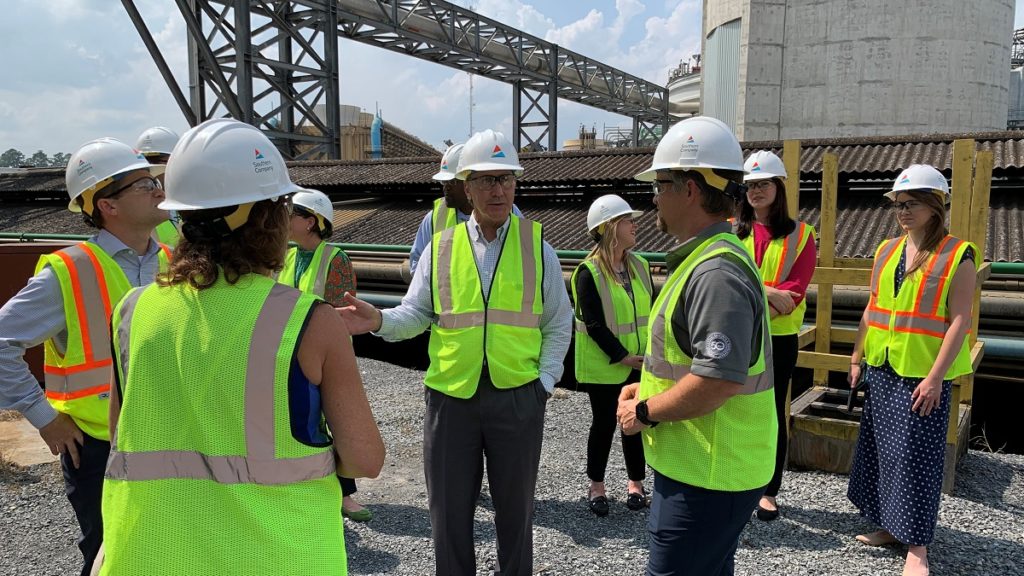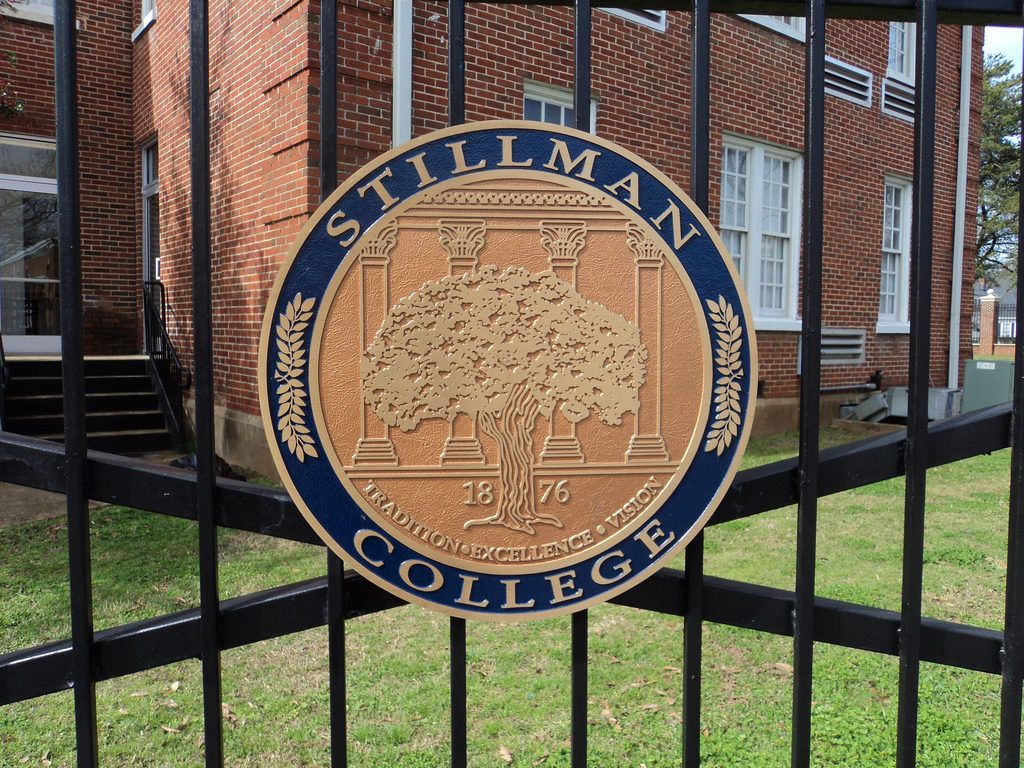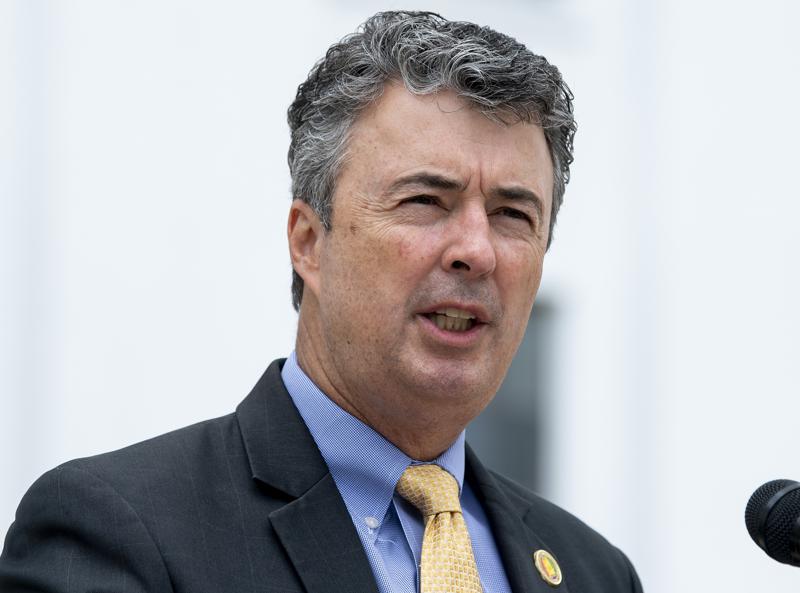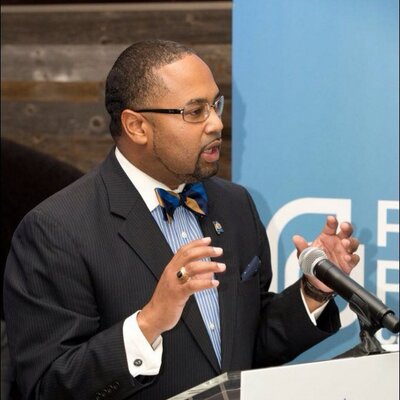Rep. Gary Palmer and staff get firsthand look at Alabama’s National Carbon Capture Center

U.S. Rep. Gary Palmer (R-Hoover) got a firsthand look at one of Alabama’s premier energy research facilities Wednesday, taking his entire staff for a tour of the National Carbon Capture Center (NCCC) in Wilsonville. The facility is operated by Southern Company at Alabama Power’s Plant E.C. Gaston. Earlier this year, Palmer was the first representative from Alabama in more than 30 years to be appointed to the House Committee on Energy and Commerce, which has jurisdiction over a broad range of areas, including energy, interstate and foreign commerce, and environmental policy. In Wilsonville, Palmer learned how Alabama experts at the U.S. Department of Energy (DOE) facility are finding solutions to deliver on President Joe Biden’s ambitious climate change goals, which include cutting America’s carbon emissions in half by 2030 and reaching net-zero greenhouse gas emissions no later than 2050. “We are happy to have Congressman Palmer and his entire staff at the National Carbon Capture Center here at Alabama Power’s Plant Gaston,” said Alex McCrary, Alabama Power director of Corporate Affairs. “Rep. Palmer understands the importance of our company’s efforts at the NCCC and the role carbon capture will play in the future of energy. We appreciate he and his staff taking the time to learn more and are grateful for the work they do in Washington on behalf of our great state.” Established in 2009 as a neutral test bed for DOE’s National Energy Technology Laboratory (NETL), the NCCC is nationally and internationally recognized for accelerating the development of next-generation technologies designed to remove carbon dioxide from a power plant’s flue gas stream. Technology developers from seven countries have come to the Alabama facility to learn from its infrastructure and the expertise employees offer. “Rep. Palmer’s support of our work is invaluable as Southern Company seeks to advance technologies that will create an affordable, reliable, net-zero energy future,” said John Northington, NCCC director and director of net-zero technologies for Southern Company R&D. “Achieving decarbonization will take a diverse portfolio of solutions, and our real-world testing of carbon capture is critical in propelling promising technologies toward commercialization.” Palmer and his staff learned how the NCCC is moving into the emerging area of carbon utilization, where carbon emissions are used to manufacture value-added products like cement. A test for Carbon XPRIZE winner CarbonBuilt this spring successfully produced low-carbon concrete. Sectors like cement and steel face a particular challenge in decarbonizing their businesses. Under a collaborative agreement with NETL, renewed in October 2020, the center’s research scope was formally expanded to new areas of technology development. This expansion included carbon capture for natural gas power generation in addition to carbon utilization and negative-emission solutions, such as direct air capture. The project has reduced the cost of carbon capture from power generation by approximately 40%.
Tommy Tuberville leads effort to designate ‘National HBCU Week’

U.S. Senators Tommy Tuberville and Tim Scott have introduced a resolution to designate the week of September 6, 2021, as “National Historically Black Colleges and Universities Week.” The resolution would honor and recognize the contributions of HBCUs across the nation. There are 107 colleges in the United States that are identified by the US Department of Education as HBCUs. Alabama has 13 HBCUs, the most of any other state. They significantly contribute to the economic prosperity of the state. According to UNCF, HBCUs create over 15,000 jobs and have an economic impact of $1.5 billion. The Higher Education Act of 1965, defines an HBCU as: “…any historically black college or university that was established prior to 1964, whose principal mission was, and is, the education of black Americans, and that is accredited by a nationally recognized accrediting agency or association determined by the Secretary [of Education] to be a reliable authority as to the quality of training offered or is, according to such an agency or association, making reasonable progress toward accreditation.” “There are over 100 HBCUs across the nation, but no state is home to more than the great state of Alabama,” said Senator Tuberville. “Each one of the 13 HBCUs in Alabama plays a key role in providing a high-quality education and empowering young men and women with the resources for success. Whether it be a two-year college or four-year university, the important contributions of HBCUs are engrained in our great state, and I am proud to honor the work they do and values they instill.” Scott commented, “America’s HBCUs are an integral part of our nation’s higher education system and provide pipelines to opportunity for millions of students, many of whom come from underserved communities. HBCUs have been engines of innovation in states like South Carolina, and their impact is felt across the nation. I am proud to recognize their importance and will continue to build on the good work we’ve done on Capitol Hill to support the HBCU community.”
Alabama AG announces $3M settlement with Tyson over spill

A $3 million settlement has been reached with Tyson Farms, Inc. over a 2019 wastewater spill that killed an estimated 175,000 fish — one of the largest recorded fish kills in Alabama history, Attorney General Steve Marshall said Wednesday. The settlement agreement, filed in Walker County Circuit Court, brings an end to the lawsuit brought by the state in April 2020 over the spill in the Mulberry Fork of the Black Warrior River, Marshall said. The lawsuit alleged the meat company illegally discharged thousands of gallons of partially treated wastewater in May and June of 2019 that ended up in the state’s waters after a pipe failed. The spill angered local residents in northern Alabama as waves of dead and decomposing fish washed down the river for days. The settlement, valued at $3,025,000, directs money to the affected communities for specific projects and requires Tyson take steps to lessen the possibility of such a spill happening again, Marshall said. “I am pleased to finally be able to tell the communities of the Mulberry and Sipsey Forks that the state has resolved this matter,” Marshall said. “Though my Office was ready to go to trial, I am convinced that this agreement prioritizes the concerns that I heard from locals and gets money into the right hands quickly.” In a statement, Tyson expressed remorse over the 2019 spill and said it is establishing new environmental governance and management systems. “We deeply regret what happened in 2019 at our Hanceville, AL facility and have taken steps to make it right. We’re pleased this matter has been resolved in a way that reflects the significant enhancements we’ve made at our facility, our commitment to provide funds to benefit the local communities in Cullman and Walker Counties, and increased public access to the river so many people enjoy,” the company said. The spill occurred on June 8, 2019, when a pipe failed at the River Valley Ingredients poultry processing facility in Hanceville, sending tens of thousands of gallons of partially treated wastewater into the river. Black Warrior Riverkeeper, an environmental group that works to protect the river, said the settlement is a better outcome than if the state had tried to fine Tyson, but it had hoped the company would have been fined at least $10 million, with the majority of the money going toward restoration and conservation of the section of the river “most affected by this tragedy.” “While it remains to be seen what the $1.5M will be spent on in Cullman and Walker counties, no portion of that amount can possibly provide adequate retribution for the river and its inhabitants,” the group stated. “Black Warrior Riverkeeper will continue to keep watch over Tyson’s operations and push for more stringent enforcement of environmental laws in Alabama.” Described as the “largest poultry rendering facility in the country,” the facility would take parts of chicken not desired for human consumption and turn it into animal and pet feed. Tyson says the spill occurred because some temporary piping installed by an outside contractor failed, sending partially treated wastewater into the river. Republished with the permission of the Associated Press.
National organization questions transparency of Alabama’s business incentives

Alabama hands out millions of dollars in industrial incentives to lure jobs to the state, but taxpayers are too often left in the dark about the deals and what the state ultimately gets in return, a new report from an advocacy group said. Jobs to Move America, a worker advocacy and research nonprofit, released a report Tuesday saying Alabama does a poor job compared to other states in disclosing information about incentives. “Alabama taxpayers are left in the dark about even the most basic details of these deals,” the report stated. “The state does not provide any transparency around which companies are receiving economic development incentives, how much they’re getting, how many jobs are created (or not) and at what wage level.” The report was compiled by Patricia Todd, a former Democratic legislator in the Alabama House of Representatives, who described her difficulty as an elected representative in trying to obtain more information about the projects. “We’re not against incentives,” Todd said. “There’s needs to be more accountability and transparency on how these deals are doled out.” Commerce Secretary Greg Canfield, in a response to the report, defended the state’s use and disclosure of incentives. “We can point to numerous examples where incentives have played a role in industrial growth and job creation across Alabama. This includes Mercedes and other automakers, along with Airbus and other companies that have put down roots in Alabama.” The department said it routinely releases information regarding incentives on major projects as they are announced, and Commerce Department said Canfield provides a report on incentives authorized under the Alabama Jobs Act to the Joint Legislative Oversight Committee. But Todd said the reports lack details about individual projects, including the name of the company. ThyssenKrupp, in 2007 agreed to locate its new steel-processing plant to Mobile after receiving a package of state and local incentives. Todd said she and her colleagues in 2006 approved raising the debt limit for the state’s incentive fund based on assurances from the governor that it was necessary to win the project. Six years later, ThyssenKrupp sold the plant, amid fallout from the recession, to another company. The group recommended several changes, including annual public hearings on corporate subsidies, an economic development budget that would provide a comprehensive accounting of all economic development programs. It also recommends hiring an independent party to evaluate each incentive and provide a report on a public website that includes the amount of incentive, pay scale of workers, return on investment, and job outcomes. Republished with the permission of the Associated Press.
Napoleon Bracy selected for highly competitive Stacey Abrams Fellowship

Alabama State Rep. Napoleon Bracy has been selected to the Stacey Abrams Fellowship. The highly competitive fellowship recently added five states to its fellowship program. This year, the program will include South Carolina, Tennessee, Alabama, Mississippi, and Louisiana. Founded by Georgia politician Stacey Abrams, Fair Fight is a voting rights group that has been devoted to expanding knowledge and awareness of issues like voting rights, legislative functionality, and grassroots advocacy. Until now, the group has focused on developing a cohort of elected officials in the state of Georgia. Starting this year, Fair Fight will work with partner organizations on the ground in five additional states to select state legislators to become Senior Fellows. The program will last two months and culminate in a joint graduation ceremony with the Georgia Senior Fellows and keynote speaker Stacey Abrams in December 2021. In a February op-ed in the NYT written by Abrams and Lauren Groh-Wargo titled “How to Turn Your Red State Blue, Abrams wrote, “The steps toward victory are straightforward: understand your weaknesses, organize with your allies, shore up your political infrastructure and focus on the long game.” She concluded the piece, saying, “Our approach was rooted in the demographic numbers and in the moral clarity provided by an authentic, multiracial, multiethnic, multigenerational and truly statewide coalition.” “People often write off the South as a place where elections and fights for progressive values are unwinnable—but we’re proving that the South is ground zero for the next wave of progressivism in this country. Through the Fair Fight National Fellowship Program, we will continue to support and develop the next generation of strong progressive leaders across the South,” said Fair Fight Political Director André D. Fields. One of Alabama Today’s most influential people of 2021, Bracy was elected to the Alabama State House of Representatives in 2010. Representing Mobile, Alabama, he was elected as Chairman of the Alabama Legislative Black Caucus in 2013. Bracy is the Manager of Diversity, Inclusion, and Affirmative Action for Austal USA, a defense contractor for the US Department of Defense. Bracy posted on Facebook, “I am proud to be selected as a Fair Fight Action Fellow with Stacey Abrams along with other southern legislators fighting for better access to the ballot box! Let’s turn Alabama Blue! We are learning from the best!”


